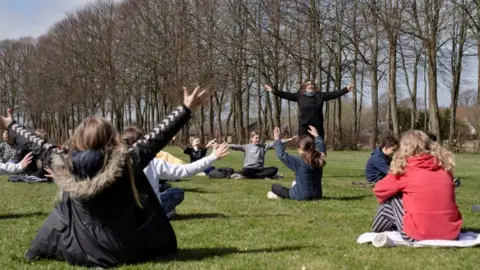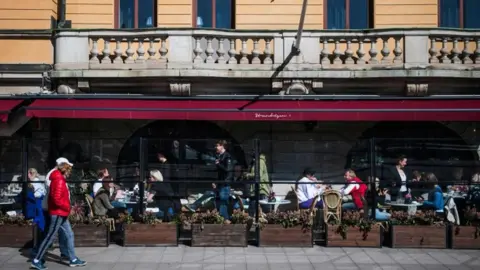Coronavirus: Denmark to reopen hairdressers as it loosens lockdown
 Reuters
ReutersIt began with schools for young children this week - now Denmark will allow beauty salons, hairdressers and tattoo parlours to reopen on Monday.
Denmark moved fast to tackle the outbreak, imposing restrictions on movement early on 12 March, while neighbouring Sweden decided to steer clear of severe measures.
Companies that do go back to work will have to follow guidelines.
Any further easing will depend on Danes respecting social distancing rules.
"No-one wants to keep Denmark closed a day more than is absolutely necessary," Prime Minister Mette Frederiksen wrote on Facebook. "But we mustn't go ahead faster than we are able to keep the epidemic under control."
What will open and what won't
Hairdressers, dentists, tattooists and driving school instructors will be allowed to resume work. Other professions include:
- Physiotherapists
- Psychologists
- Beauty and massage salons
- Optometrists
- Podiatrists
- Spa clinics
- Piercing studios
- Chiropractors
The courts will reopen on 27 April. Cafes, restaurants and schools for ages 12 and over will not. Those who are allowed to go back to work but feel the time is not yet right will still be allowed to claim government compensation.
Work will also be carried out to enable family visits to vulnerable people, both the elderly and children.
As soon as details of the relaxation became clear, one of Denmark's biggest online hairdresser booking systems, ordering.nu, crashed, Ekstra Bladet reported. The newspaper suggested that Danes crying out for a haircut had all tried to book at the same time.

How will it work?
By Adrienne Murray, Copenhagen
When young children returned to schools and nurseries on Wednesday, it certainly wasn't a normal school day. Lots of new health and safety rules had to be met before schools could open their doors. Inevitably many weren't ready.
That's very likely to happen next week when Denmark allows a number of smaller businesses to reopen. Much of the work done by hairdressers, tattooists, dentists or opticians requires close contact with customers.
Businesses will need to comply with health guidelines on hygiene and distance, but rules will vary sector by sector, and details are still being ironed out.
The Dental Association says it is still waiting to hear whether extra protective clothing or visors will be needed.
One hairdresser told me she was fully booked for the next three weeks, and planned to open on Monday by taking common sense precautions and using hand sanitiser.

Allan Randrup Thomsen, professor of virology at Copenhagen university, told Danish TV that opening up cafes would be far more risky because the number of customers would be far higher than to a dentist or a hairdresser.
The decision on reopening came after political leaders, including opposition parties, reached a consensus based on advice from the SSI infectious diseases institute.
Denmark has reported 336 deaths and some 7,000 infections linked to coronavirus in a population of 5.8 million. One in five of the reported infections involved health care workers.
Elsewhere in Europe, Austria allowed small shops to reopen on Tuesday while in Germany small shops of up to 800 sq m (8,600 sq ft) will also be allowed to resume trading from Monday. Spain allowed some construction and manufacturing to resume this week.
The lockdown across Europe has had a dramatic effect on the car industry. New car sales fell by 55% in March with markets across all EU states affected.
Sweden defends its light-touch approach
Meanwhile, the Swedish government has reacted to criticism of its decision to avoid strict measures aimed at tackling Covid-19.
"It's a myth that life goes on as normal in Sweden," Foreign Affairs Minister Ann Linde told reporters, pointing out that many parts of society had shut down and that businesses were collapsing as a result of the pandemic.
Pubs, shops and schools are still open in Sweden but the government has barred gatherings of more than 50 people as well as visits to nursing homes.
 AFP
AFPSweden has seen 1,333 deaths in a population of 10 million.
The head of the public health agency, Johan Carlsson, said Sweden was relying on personal responsibility so "all citizens need to comply with legislation and recommendations".
MPs passed a law on Thursday granting the government powers to push through measures over the next few weeks that involve closing businesses, limiting public gatherings and shutting down airports.
Scientists are divided on the government's approach but polls suggest its popular with the public, the BBC's Maddy Savage reports from Stockholm. Ministers have not indicated any lockdown is imminent.
